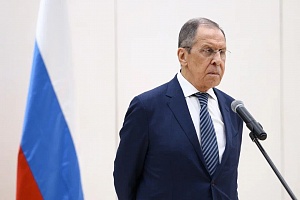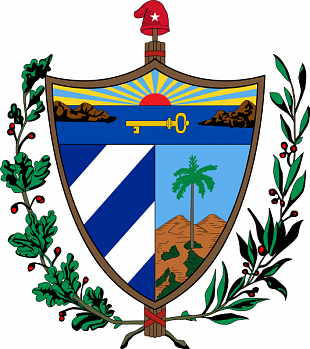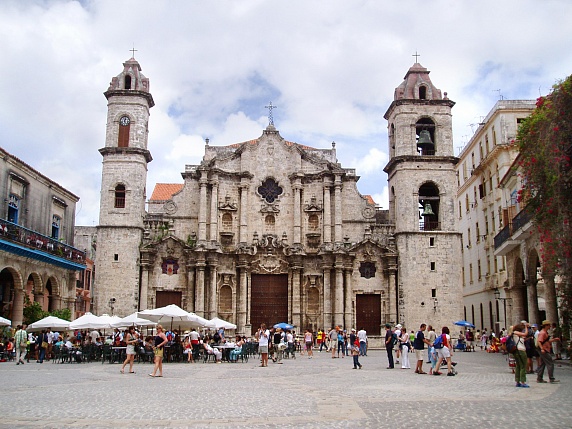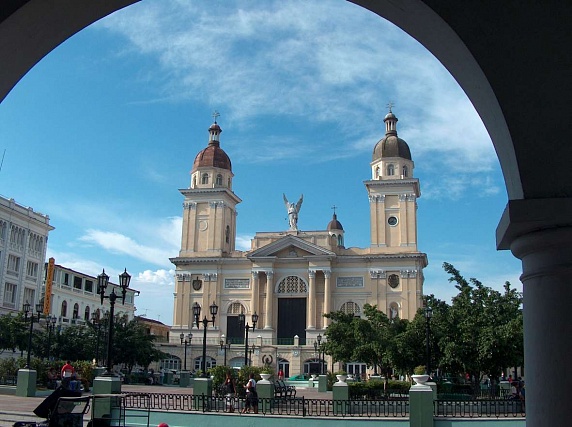 Республика Куба
Республика Куба
Foreign Minister Sergey Lavrov’s remarks and answers to media questions during a news conference following his visit to the Republic of Cuba, Havana, April 20, 2023
Ladies and gentlemen,
During this visit to Cuba, we held comprehensive talks with President of the Republic of Cuba Miguel Diaz-Canel Bermudez, General Raul Castro and Foreign Minister Bruno Rodriguez.
This visit took place at a time of a landmark event in the development of the modern Cuban state: the 10th Legislature of the National Assembly of People’s Power of Cuba, which ratified President Miguel Diaz-Canel Bermudez for a new term. The assembly also approved other key appointments in the Cuban leadership, including Foreign Minister Bruno Rodriguez.
Today we discussed the entire range of our bilateral relations in the context of the implementation of the agreements that were reached at the highest level during the visit of President Miguel Diaz-Canel Bermudez to Russia in November 2022. We talked about coordinating our relations in several other areas where we can develop and build up our trade and economic cooperation ahead of a meeting of the Russian-Cuban Intergovernmental Commission on Trade, Economic, Scientific and Technological Cooperation, which will be held in Havana in a month’s time.
We pointed out that we have drafted and are implementing decisions that will reliably protect our trade, economic and investment ties and projects from the effects of the illegal Western sanctions.
Apart from working at the bilateral level, we are also actively promoting the development of Cuba’s cooperation with the EAEU, where Cuba holds observer status.
Prime Minister of Cuba Manuel Marrero Cruz will attend a meeting of the Eurasian Intergovernmental Council, to be held at the prime minister level in the first half of June, in the capacity of observer. After that, he will travel to our northern capital to attend the St Petersburg International Economic Forum. The participation of our Cuban friends in these events will open up new perspectives and areas of bilateral trade and economic interaction.
We discussed the successful development of Russian-Cuban humanitarian, cultural, educational and scientific ties.
Our miliary and law enforcement agencies maintain close contacts and exchange experience in areas related to the maintenance of reliable security.
Regarding international affairs, we reaffirmed our full solidarity with Cuba when it comes to combating the attempts by the United States and the collective West as a whole to maintain their domination on the international stage by unscrupulous means. If anybody had any doubts left regarding this, the past two years clearly showed that diktat, blackmail, threats and sanctions are the only methods the United States is using in international relations.
Together with our Cuban friends, we are taking part in collective efforts to counter such policies and establish fair principles in global affairs with strict compliance with the principles of the UN Charter in their entirety and, above all, the principle of the sovereign equality of states.
This is our approach to and purpose of the cooperation with our Cuban partners as part of the Group of Friends for the Defence of the UN Charter established in New York, the interaction between the Non-Aligned Movement and the Russian Federation, and between our country and the Group of 77, which Cuba currently chairs, as well as the ties we are vigorously expanding with Latin American and Caribbean regional organisations including CELAC, UNASUR, MERCOSUR, CAIS, etc. We have outlined specific steps to move forward on these and many other tracks.
I invited Cuban Foreign Minister Bruno Rodriguez to pay a return visit to the Russian Federation. We should be able to announce the dates in the foreseeable future.
Question: Russia is stepping up cooperation with Latin American countries. Regular flights could be a step towards strengthening such cooperation. A number of countries have expressed an interest in this. But the national carrier, Aeroflot, does not yet offer regular flights to any of the Latin American capitals. Is this issue under consideration? If so, at what stage is it, and when can we expect the start of regular flights?
Sergey Lavrov: Our airlines make their own decisions. They are all commercial companies, and they expand their destinations on a commercial basis.
As for our Ministry, we are interested in having more direct connections between our countries and other friendly states by air as well as by other ways. But it's up to the airlines to decide.
I know that two or three of our airlines make charter flights to Cuba. Russian tourists who like to vacation in Cuba are certainly taking advantage of them. I am sure that expanding opportunities for tourism is on the agenda of the Intergovernmental Commission on Trade, Economic, Scientific and Technical Cooperation.
Question (retranslated from Spanish): How do you assess trade and economic relations with the United States, given the sanctions imposed on Russia and Cuba?
Sergey Lavrov: If you are asking about Russian-American relations, Russia and the United States do not have a special relationship. We talk only when necessary, and discuss the problems that arise in the embassies’ work. This also happens because the United States is trying to abuse its position as a UN host country.
Everyone knows and understands that the Americans have declared a crusade against the Russian Federation, Russia’s legitimate interests, culture and traditions, choosing the Nazi regime in Kiev as a warhead and pouring new weapons systems into Ukraine. It should be clear to everyone that this is a futile policy.
Question (retranslated from Spanish): President of Cuba Miguel Diaz-Canel Bermudez recently visited Russia. What specific results have been achieved in bilateral cooperation?
Sergey Lavrov: We have achieved many goals that were discussed and agreed upon during President of Cuba Miguel Diaz-Canel Bermudez’s visit to the Russian Federation – primarily with respect to fuel and food supplies to Cuba. This work is currently in its final stage. The first results will be announced in the next few days. I believe the final discussion will take place at a meeting of the intergovernmental commission in Havana in mid-May. You will certainly be notified about additional progress.
Surely, finalising the terms of Cuba’s debt restructuring has been instrumental in our progress and achievements.
Question: In view of our current relations with the United States, are there any plans to restore a Russian military base in Cuba?
Sergey Lavrov: Our defence cooperation with Cuba is developing successfully in line with the agreements reached by the two countries. As far as I understand, both Russia and Cuba are satisfied with the forms of this defence cooperation.
Question: Are BRICS countries planning to choose an alternative currency and which currency would it be?
Sergey Lavrov: The BRICS countries have long been taking measures to reduce the share of US dollars in mutual payments and shift to payments in national currencies.
President of Brazil Lula da Silva recently proposed considering a collective currency within BRICS. We will participate in these discussions with great interest. Clearly, this process cannot be fast. But it is a fact that the overwhelming majority of the countries understand the importance of beginning this process and taking swift action.
Question (retranslated from Spanish): Could you please tell us about new aspects of the recently approved concept of Russia’s foreign policy? How will it affect the confrontation with the United States and the European Union? How will it affect the rest of the world, especially Latin America and the Caribbean?
Sergey Lavrov: The new version of the concept of Russia’s foreign policy pays significantly more attention to Latin America and the organisations operating on the continent – first of all, the Community of Latin American and Caribbean States (CELAC). We also prioritise the relations with our long-term strategic partners, including Cuba, which is close to our hearts.
This concept does not involve imposing any solutions on Latin American and Caribbean countries from outside. It is based on our interest in developing our relations built on mutual respect, mutually beneficial progress in the economy, trade and foreign policy.
Question: A number of European countries (Romania, Poland, Bulgaria, Slovakia, and Hungary) have announced a ban on Ukrainian grain imports. The number of these countries is growing. There is talk of banning other agricultural imports from Ukraine, although these countries are Kiev’s direct ideological partners. What are all these decisions about?
How is the grain deal faring? What are its prospects? Can Russian grain supplies to Latin America be increased?
Sergey Lavrov: These developments confirm our well-known fundamental assessments. As distinct from the initiatives announced by UN Secretary-General Antonio Guterres, who focused on the need to help the poorest countries, the grain deal in its Ukrainian aspect is predominantly commercial. As such, it is hardly of any help to the Third World countries.
Ukrainian grain, offered, in fact, at dumping prices and with zero tariffs, is invading the European markets in circumvention of all phytosanitary requirements. This makes traditional grain producers in Europe itself sustain huge losses.
I hear the European Commission has offered to compensate these losses, for which purpose it is allocating 100 million euros. It would be more honest to buy cheap Ukrainian grain at knock-down prices and supply it free of charge to food-scarce poorest countries. But the European Union, as for that matter the Americans, is not interested in this. They are interested in further commercialising the grain exports from Ukraine, including as part of the Black Sea initiative.
The lion’s share of grain and other agricultural products was supplied from Ukraine’s Black Sea ports to Western countries or to wealthy countries on other continents, not to the poorest countries.
Given that UN Secretary-General Antonio Guterres’ initiative was intended for the poorest countries, we took advantage of the mechanisms envisaged by the Black Sea initiative to insist that ships leaving Ukrainian ports provide information as to where they are carrying their cargo. Our aim was absolutely clear: we wanted to mark the ships heading for poor developing countries, primarily those in Africa, as having the priority right to pass through the straits.
The Ukrainian members of the inspection group in Istanbul attempted to prevent the disclosure of this information. All of this is not adding optimism as to the true aims of those who were so active in upholding this deal within the framework of the Black Sea initiative.
As for the other inalienable part of UN Secretary-General Guterres’s initiative, that is the removal of all obstacles to Russian fertiliser and grain exports, practically nothing has been done in this regard.
We are pro-actively looking for opportunities for sending Russian food and fertilisers to the world markets. But all of this is done contrary to the UN Secretary General’s initiative rather than as part of it. The UN officials reply to all our reminders and requests that they are working hard, doing whatever they can, and will continue in this vein. But soon, one of these days, it will be nine months since the start of the initiative, and look at them still “working hard.” It’s all quite obscure.
We meet our Latin American colleagues’ demands for grain and other types of food. I heard no complaints from anyone. Now our Cuban friends are negotiating with us a special loan for additional wheat supplies.













